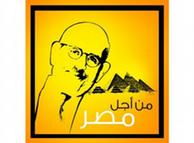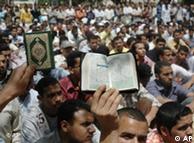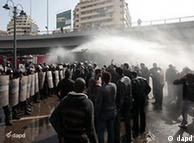MIDDLE EAST | 28.01.2011
ElBaradei strengthens his tone as Egypt's regime clamps down harder
Mass protests are underway in Egypt following traditional Friday prayers. Tens of thousands of demonstrators are defying a government ban and gathering in Cairo. Eyewitnesses said police used water canons and fired warning shots to disperse the protesters.
The opposition groups calling for President Hosni Mubarak to stand down were expected to be joined by Mohamed ElBaradei, the dissident opposition figure, who returned to Cairo on Thursday.
But reports from Arab broadcaster Al-Jazeera suggested that ElBaradei had been detained at a mosque in Cairo and was being prevented from joining the protests by security forces.
Earlier Friday, ElBaradei spoke to the British Guardian newspaper, striking his hardest tone yet since flying into the country from Vienna on the previous evening.
"I'm sending a message to the world that Egypt is being isolated by a regime on its last legs," he told the Guardian.
"There is of course a risk to my safety today, but it's a risk worth taking when you see your country in such a state you have to take risks," he added. "I will be with the people today."
As the Mubarak regime cracked down on mobile phone and Internet services, effectively cutting the lines of communication between the opposition groups and isolating Egypt off from the rest of the world, ElBaradei called on the international community to take action.
"Egypt today is in a pre-information age," he said. "The Egyptians are in solitary confinement – that's how unstable and uncomfortable the regime is. Being able to communicate is the first of our human rights and it's being taken away from us. I haven't seen this in any other country before."
"The international community must understand we are being denied every human right day by day," he said. "Egypt today is one big prison. If the international community does not speak out it will have a lot of implications. We are fighting for universal values here. If the west is not going to speak out now, then when?"
His statements were much harsher than those he maqde on his return when ElBaradei, a Nobel Peace Prize winner and former head of the International Atomic Energy Agency, indicated that he would help head a transitional government should the current regime fall.
"If people, in particularly young people, if they want me to lead the transition I will not let them down. My priority right now is to see a new Egypt and to see a new Egypt through peaceful transition," he said on his arrival in Cairo. "I am still here hoping to continue to manage the process of change in an orderly way, in a peaceful way. I hope the regime will do the same."
"I hope the regime will stop violence, stop detaining, stop torturing people."
Protest groups look to ElBaradei for focus and leadership
Some observers are unsurprised by the growing clamor for ElBaradei to lead the disparate opposition factions, give them focus and help channel the frustrations of the Egyptian people into positive political change.
"The opposition has been weak and stagnant for so long that it is no surprise that they are rallying behind ElBaradei," Dr. Amr Hamzawy, research director at the Carnegie Middle East Centre in Beirut, told Deutsche Welle. "They have very little representation in parliament, their work and ability to reach out effectively to constituencies has been heavily restricted since the state of emergency came into power in 1981 and they have failed to convince Egyptians that they have a solid platform and policies."
 Campaigns of support for ElBaradei are growing in Egypt"The opposition is splintered along an ideological divide, between Islamists and secularists and its potential power has been stripped by constant in-fighting. Those who are in a position of relative power are there because they have struck a deal with the government; they agree to limit their reach in return for a guaranteed percentage of seats."
Campaigns of support for ElBaradei are growing in Egypt"The opposition is splintered along an ideological divide, between Islamists and secularists and its potential power has been stripped by constant in-fighting. Those who are in a position of relative power are there because they have struck a deal with the government; they agree to limit their reach in return for a guaranteed percentage of seats."Kristian Ulrichsen, a Middle East expert at the London School of Economics and Political Science says that ElBaradei fits into the picture and could provide a focal point. "As a high-profile and internationally well-known opponent of the regime he could provide the figurehead with the domestic legitimacy that the Tunisian opposition lacked in comparison."
However, ElBaradei's arrival and pledges of support will not necessarily solve all the problems facing the opposition as they look to ouster the Mubarak regime. Indeed, his return could generate a whole new set of issues to contend with.
Critics of returning dissident refuse to accept him
The Muslim Brotherhood, Egypt's largest opposition group, has continually rejected the idea of supporting ElBaradei's potential appointment as a unifying opposition leader. "Those who support ElBaradei are an elitist bloc with no roots in the Egyptian street," senior Brotherhood leader Mohammed Habib has been quoted in local media as saying.
The Brotherhood, whose members have so far participated individually in the protests, announced Thursday that it would collectively join the demonstrations on Friday.
"El Baradei's ability to project himself as a figurehead might be constrained by his narrow base of political support in Egypt’s middle classes," Ulrichsen said. "He will need to expand this if he is to become a viable leader in waiting, and in particular will need to reach out to the Muslim Brotherhood to secure their tacit acquiescence, at the very least."
Leadership accession will only be the start
 The Muslim Brotherhood rejects ElBaradei as an elitistShould ElBaradei succeed in uniting the opposition forces and lead a peaceful transition government if and when Mubarak stands down, the initial galvanising effect his leadership might have would make way for increased pressure to tackle Egypt's social and economic problems.
The Muslim Brotherhood rejects ElBaradei as an elitistShould ElBaradei succeed in uniting the opposition forces and lead a peaceful transition government if and when Mubarak stands down, the initial galvanising effect his leadership might have would make way for increased pressure to tackle Egypt's social and economic problems.Analysts believe it will take more than just a change of leadership to successfully implement the structural challenges needed in Egypt's faltering political economy.
"Pressures for political reform and liberalisation may also expose a rift between demands for democratic change on the one hand, and for greater religiosity in public life on the other," Ulrichsen said. "The attitude of the United States as a major security and donor partner will also be important, and ElBaradei will need to balance their interest in a stable Egypt with the more transformative aspirations of the popular protests which have risen in recent weeks."
Author: Nick Amies
Editor: Rob Mudge
dw


No comments:
Post a Comment